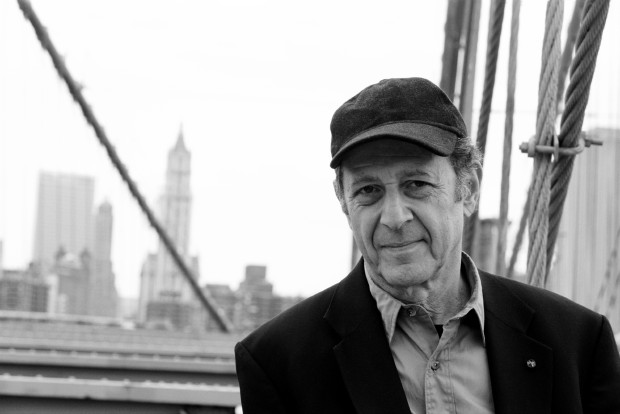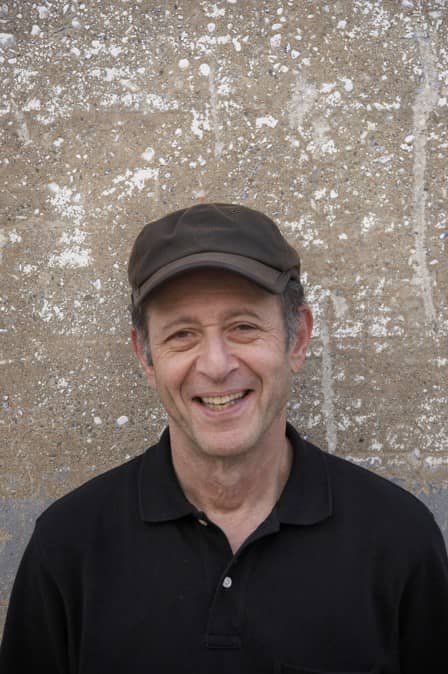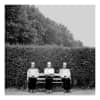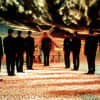As a child, Steve Reich repeatedly took trains from California to New York to visit his divorced, bi-coastal parents. The years he was doing that, he later realized, were the same years of the Holocaust. From that realization, in 1988, he composed “Different Trains,” a string quartet which uses bits of audio recordings of those involved in his train rides and of Holocaust survivors. In the years since, he’s worked frequently with vocal samples, and this Saturday at Carnegie Hall sees the New York premiere of his latest piece with samples, “WTC 9/11.” Reich, now a Vermonter, was a longtime NYC resident and composed the piece to finish what he describes as “unfinished business” with that day. Much more chatty and excitable than your average New England grandpa, Reich spoke at length about the connection between those two pieces, how he conceived “WTC 9/11” and whether or not he still gets nervous about playing Carnegie Hall.
I was struck by you saying that, for you, September 11 was not a media event. It made me think about “Different Trains,” it seems like that piece and "WTC 9/11" have parallels in the way that you dealt with them. Did you consider “Different Trains” in composing “WTC 9/11”? Certainly the techniques are related. I mean, I’m using pre-recorded voices and having the voices imitated by the players in the string quartet. So, on that level, absolutely there’s a connection between the two pieces. The content is different. As a kid living in America, thank god the Holocaust was something that I saw in the movies. There was no one in my family, well in my immediate family, who was closely connected to the Holocaust, thank god. Whereas in “WTC 9/11,” we lived for 25 years four blocks from Ground Zero. That’s why I said it wasn’t a media event, it was a personal event. But, in terms of the actual “WTC 9/11,” none of my family, their voices are not in the piece, my voice is not in the piece. But, everybody who’s concerned with the event around me, most certainly, is in the piece.
The piece starts with the voices of the air traffic controllers who were the first to notice that American Flight 11 was off course and heading south when it should’ve been heading west to LA. And then you hear the voices of New York City Fire Department over here on the ground, and I’m sure you’re aware of their role that day—their very, very heavy involvement, to the point where many of them left their lives. You hear that very rapidly, its only three-and-a-half minutes of that, then it comes to a rather breathless, dramatic close.
The next movement is interviews that I made with friends and neighbors nine years later. It opens with the daughter of my next-door neighbor who was in fourth grade, who’s now 17 I guess, who says, “I was sitting in class four blocks north of Ground Zero.” That’s followed by my friend, the composer David Lang, who’s one of the founders of Bang on a Can, saying, “I was taking my kids to school.” That’s what was happening to these people when this plane flew over their heads and smacked into the first tower. So the piece is built around people that I had direct contact with or who were, like the firemen or the air traffic controllers, involved themselves. What that does is to give you the voice of people who…they’re witnesses, they’re participants. It’s very difficult to take an event, like in, let’s say “Different Trains,” and use people who were in the Holocaust. But the only way to deal with it, as I see it, is to have people who were survivors of the Holocaust talking about their lives. Because they, and only they, can talk about that, very simply and directly because it’s just reminiscing about something that they unfortunately lived through. And, in “WTC 9/11,” you’re hearing people who were involved, who were there. It happened to them. And you’re hearing them the day it happened, which is a very intense kind of speaking because people, you know, were very confused and very scared and totally wrapped up in what’s going on. And then the reminiscent voices in the second movement are the people who were there now thinking about what happened to them way back then.
The last movement is a bit different. But it is, again, people who were directly involved. There’s a law in the tradition of Judaism that you don’t leave a dead body alone from the time of death until the time of burial. I had become re-involved in Judaism back in 1975, but I didn’t know this particular practice. It was actually picked up by the New York Times and I read about it at the time and it struck me like, “Wow, that’s really beautiful!”
Women who were at Stern College in the '30s at Lexington could walk on the Sabbath basically over to NYU Hospital where the bodies were. And the parts of bodies were refrigerated. And sit there and sing, or say, or chant songs or parts of the bible. Two of the women I interviewed, actually one lives in Seattle now but she was there, but the other one used to be the president of Boosey and Hawkes, my publisher. But when 9/11 happened she was involved in doing this. Now, she left the company quite some time ago, she’s a lay chaplain of the Columbia Presbyterian Hospital. So, people have interesting lives. This particular woman covered a lot of bases.
The piece ends actually by going back to the way it opened, which is these religious practices that were quite beautiful and a very fitting way of dealing with the people who died on that day. That’s not the end of the matter for us right here in this world. “WTC” has a double meaning, which is World to Come. We’re not living the World to Come as yet. We’re living in the world right here, and the piece ends with that, which is basically…ever leave your phone off the hook by mistake and it plays a recording of “Please hang up”? If you don’t do what the voice tells you, then you hear this really loud beep. Well, this loud beep struck me as something that I wanted to put in the piece. The piece begins with that loud beep—is actually an F, the pitch F—and the piece begins with David Harrington, the first violinist of Kronos [Quartet], doubling the telephone beep. And then John Sherba playing a semi-tone below that. And that really kind of grabs your attention, because it is an alarm sound. It’s an alarm signal. And the piece goes back to that at the end because, unfortunately, the events of 9/11 were not the end of anything. They were the continuation of something that’s been going on for a long time and, as you know very well, it’s very, very, very much with us as we speak.

The way you speak about “WTC 9/11”—and I think this is similar for “Different Trains”—is that both of them feel like forms of portraiture. With both pieces, what compelled you to include such close personal voices, your own or others? “Different Trains” is more autobiographical. “WTC 9/11” is really not autobiographical. it is something that I was a participant in. I actually was in Vermont, and so was my wife, but my son and my granddaughter and my daughter-in-law were in our apartment four blocks from Ground Zero when it happened. And they called at 8:30 in the morning, and we were on the phone for six hours until they finally got out. So it’s a personal connection, but it’s not autobiographical.
My first thought in “Different Trains” was really just that I wanted to use a sampler with a string quartet. So actually, when I begin pieces I have an abstract idea that has no content whatsoever. The idea of “Different Trains” was: speaking voices are integrated with string players. I had no idea, none, who the speaking voices were. As a matter of fact, my first idea for a speaking voice was, “Oh, it’ll be the voice of Béla Bartók!” And I actually got a recording of Béla Bartók speaking in English on WNYC in about 1944. Then I began to think, “Wait a minute, I’m writing a string quartet, do I really want Béla Bartók looking over my shoulder while I’m doing that? I think enough is enough.” Then I thought, “Oh, I’ll use the voice of Ludwig Wittgenstein!” I studied him in college, he’s a fascinating man. Well, he died in 1951, there were only wire recorders. He was a recluse. There were no recordings of his. Then, I just thought to myself, well there must be something closer to home. And, god knows, the thoughts of my personal trips on these trains popped into my head. Only later, did I think, like I mentioned, well when did this happen? Well, this happened when little kids like me were being taken off to Poland and they weren’t talking to you on the phone today.
So the original idea for “WTC 9/11” was, again, I don’t know who’s talking, I have no idea whatsoever. But I do know this, that the last syllable they say, whether it’s a consonant or a vowel, will be elongated. So, if I say, “That was a perfect zero,” it will be like, “zeroooo.” The zero goes on and on as long as you’d like it to. Or, “I caught a fisssshhh,” the noise band goes on as long as you’d like. And that was the first idea for “WTC 9/11.” I had no idea what it was about. Zero! And then, later, I began to think, “Wait a minute, I have unfinished business. I never dealt with 9/11.” But, that technique of extending the final vowel or consonant is the central technique, musically, that’s used in “WTC 9/11.” All of the voices are connected that way.
Are you self-conscious about playing “WTC 9/11” in New York City in front of these people who were there and also who were actors, in a sense, in your piece?
Well, yeah sure. I’m going to answer in a parallel situation because [“WTC 9/11”] hasn’t happened yet. “Different Trains” was given a world premiere it was in Miami, actually, believe it or not, way back in ’88. There were three voices of Holocaust survivors. One of them was a woman by the name of Rachel, who was born in Brussels, and was actually put in a laundry basket and saved in a church during the war. She was living in Florida and, when the premiere was over, a guy came up to me and said, “I’m Rachel’s son and she just passed away, and I’m really sorry because I think she would’ve liked this as a kind of memorial.” And, you know, I was very moved to hear that. The woman who you hear mostly, who is a Holocaust survivor, is Rachella. She was born in Rotterdam, she now lives in Seattle. And the piece was done up in Seattle more than ten years ago. I met her and she was just very talkative and very interested and wanted to know all about how it was done, and was telling me all the details about what happened to her. The first movement of “Different Trains” was the black Pullman porter Mr. Lawrence Davis. I sent him a copy of the LP. And he wrote me back and said, you know, “You’re a really good composer, I could hear myself say from New York to Los Angeles, thank you very much.” So, I have no idea. I’ll be curious to see what David Lang says because he has a very important role in the piece and I actually stole the WTC meaning World To Come and World Trade Center from him. And I credit him for that, but I’ll be curious to see how he reacts. But no, I’m not self-conscious, but I’ll certainly be interested to hear what people have to say,
Do you still get nervous to play at Carnegie Hall? I’ll be honest with you, the answer is yeah, of course. Of course, I’m going to be nervous. But I was most nervous at Duke, because that was the world premiere of this piece. And this piece, I really didn’t know how people were going to take it. I didn’t have a handle on “WTC 9/11.” It seemed to work for me but it was just a very unusual experience for me writing “WTC 9/11.” First of all, I thought I knew it was going to be 25-minutes long, and it's 15-minutes long. That was a big surprise. The piece told me what to do and I had to keep listening. Its metaphoric but its actually how it felt when I was writing. That true to some extent of every piece, but this piece was really that way. And I have so many versions of who’s going to say what in what order crossed out. I must have ten or 15 pages in my music notebook of different dialogues different librettos all rejected. When I went down to Duke to hear it, I was like “I hope people like this, but also, what is it?” You know, I’d never heard it life either and, finally, to hear it with real strings and not MIDI mock-ups that was a big deal. So at Carnegie, I’m a little bit more optimistic but, sure of course, I’m nervous.
I’ve always found your music to be super, super catchy. And you’re really nice. Is there a connection? I think you’ll find “Mallet Quartet” to be very catchy, it’s a very melodic piece. Well, you know, you’re a better judge of that than I am. If that’s the way you see it. Other people see us better than we see ourselves.
I think you’d know if you were mean. Everybody is different in different situations.


